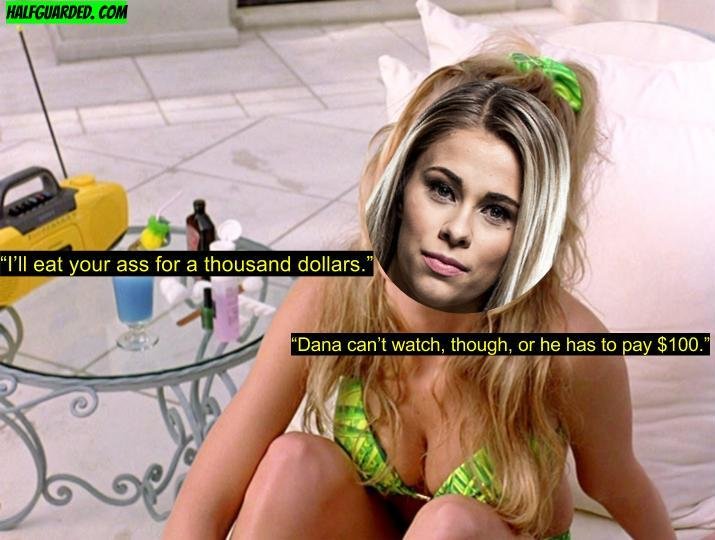According to Fortune, the UFC’s parent company WME-IMG – that stands for William Morris Endeavor-International Management Group, if you’re ever on Jeopardy! – is valued at about $5.5 billion. It’s one of the 20 richest privately-held corporations on the planet. Co-owners Ari Emanuel and Patrick Whitesell both have individual net worths exceeding $100 million. And the company’s investors include scores of multi-millionaires, including Serena Williams, Ben Affleck and The Biggest Pile O’ Shit Ever Stacked on God’s Green Earth (or, is it is more commonly known, Tom Brady.)
So this much, I think it is pretty safe to assume: the people who own the UFC are rich. Very, very rich. Richer than you could ever dream of being, multiplied by 20. No, better make that 200, just to be on the safe side. These are the kind of people so rich, they could literally wipe their asses with $100 bills just for the LOLZ. They’re so rich, they could probably kill anybody they want and get away with it. And if they’re not already involved in a PizzaGate-esque sex-slave operation, rest assured they’re rich and powerful enough to do so if they really wanted.
Long story short, these people aren’t hurting for money. The UFC is already generating half a billion a year in TV rights alone, and it’s pretty much a given that whoever gets the broadcast rights next is going to pay at least quadruple that. The company is taking in $70 million just from fighters agreeing to wear those stupid, gaudy “fight kits” to the octagon.
Let’s do the math, why don’t we? 1.6 million people paid at least $49.99 to watch UFC 202 (and remember, the high definition broadcast cost more than that.) That means on just ONE night, the UFC made at the absolute least, $80 million, and that’s not even factoring in the live gate and the money generated by Fight Pass subscribers.
That the company was sold for $4 billion lets you know this thing is producing a considerable amount of cash flow. Granted, it’s not quite the same money-making monolith as the NFL, but the UFC is quietly getting there – and without having to worry about the same money-draining trifles the stewards of pro football have to, like unions and employer-provided health care.
Which is why I always laugh a little when I read that little piracy warning at the beginning of every UFC PPV. Shit, people have been illegally streaming pay per view events since the early 2000s, and it’s not like illegal cable box hookups weren’t a thing back in the 1990s. It just begs the question: if Internet piracy is as dire and costly as the UFC keeps telling it is, how come the company is generating an exponentially greater amount of money than it was ten years ago?
Now that kind of logic don’t make any sense. Despite illegally streaming UFC PPVs being easier than making Minute Rice these days, how in the hell did the company somehow manage to have no less than FIVE pay-per-view events eclipse the one-million purchaser threshold last year? If Internet piracy was as big a financial threat as they want us to believe, shouldn’t the Pay-Per-View buyrates, you know, be going down? Shouldn’t all that Internet piracy be driving the total value of the company down? Wouldn’t all that Internet piracy make the UFC brand less appealing to the big-time networks expected to dish out a paltry $2 billion when the network TV rights go on the auction block?
ILLEGAL STREAM OF A UFC PPV: WHO DOES IT HURT?
Simply put – illegal online streams aren’t hurting the UFC a damn bit. Yeah, maybe you can show me some Willy Wonka stats about how much more money the company would’ve made had pirates paid the full MSRP for the PPVS, but let’s cut the doo-doo, why don’t we? The people who pirate UFC PPVs would never in a billion years pay to for one. They MIGHT pony up the $5 cover charge to watch it at a sports bar, but even then the UFC is theoretically losing moolah. Doesn’t the company prefer that each and every one of those paying customers were paying $50 to watch the show at home instead? Besides, it’s not like the UFC would get a cut of that kinda’ money anyway – and if they do, I’m guessing the full amount would be barely enough to cover the costs of just one percent of the money the UFC spent advertising the damn show to begin with.
The UFC’s Internet piracy jihad is just so outmoded. Do you think the NFL gives a hoot if somebody in Iowa illegally streams a Los Angeles Chargers game because he doesn’t want to watch the crappy Kansas City Chiefs game playing on CBS that week? No, because it’s not taking one cent away from the League. That would be like expecting TV viewers to pay the same price that somebody ACTUALLY attending the game at the stadium has to pay to enjoy it at home. It’s absurd, it’s an outdated business model and it’s the kind of consumer price-gouging that’s become all but extinct due to the high-speed Internet revolution.
But the UFC is STILL clinging tightly to that long, long, long passe moneymaking scheme. The owners of the Ultimate Fighting Championship still haven’t figured out what the WWE figured out years ago: pay-per-view is dying, proprietary content distribution is the future. Yes, Fight Pass is a step in the right direction, but as long as the company keeps relying so much on PPV dollars, of course they should expect illegal online streaming to continue … and as such, they should also continue to realize it isn’t hurting their bottom line anywhere near as much as they publicly proclaim.

The UFC shouldn’t expect people to shell out $60 to watch a PPV headlined by Demetrious Johnson or Cody Garbrandt or, heaven help us, Stipe Miocic. But they should expect people to illegally stream these same shows for free and watch them when they are on network TV and cable.
Which reminds me. Did you know that ALL UFC PPVs in England are streamed for free on network television? As Olympic gold medalist and serial drunk driver Kurt Angle so often stated, “it’s true, it’s true.” This naturally begs the question: if people in the U.K. can watch UFC PPVs for free, why should American audiences be expected to pay upwards of 50 smackers for the same content?
And that, of course, begs an even greater question – if not the greatest rhetorical philosophical conundrum since that old “if a tree falls in the woods” chestnut: if an American streams a live PPV broadcast from a network in England whose viewers get to watch UFC PPVs for free, is it really illegally streaming at all?






